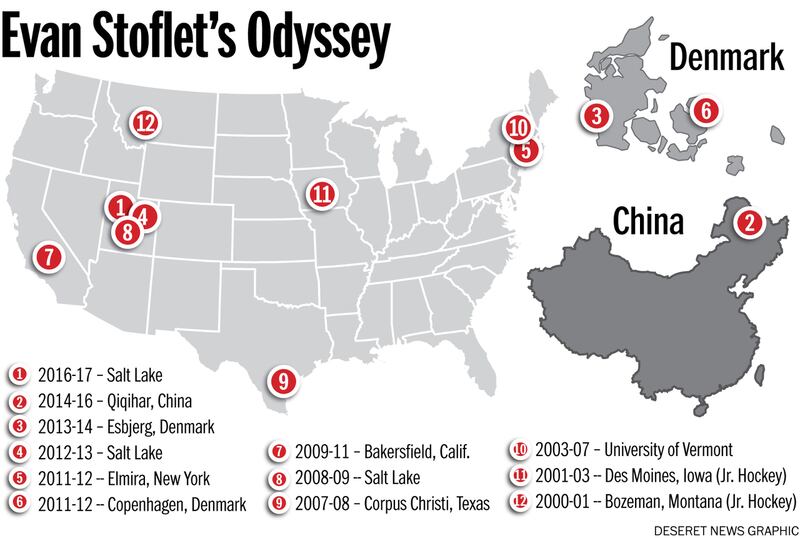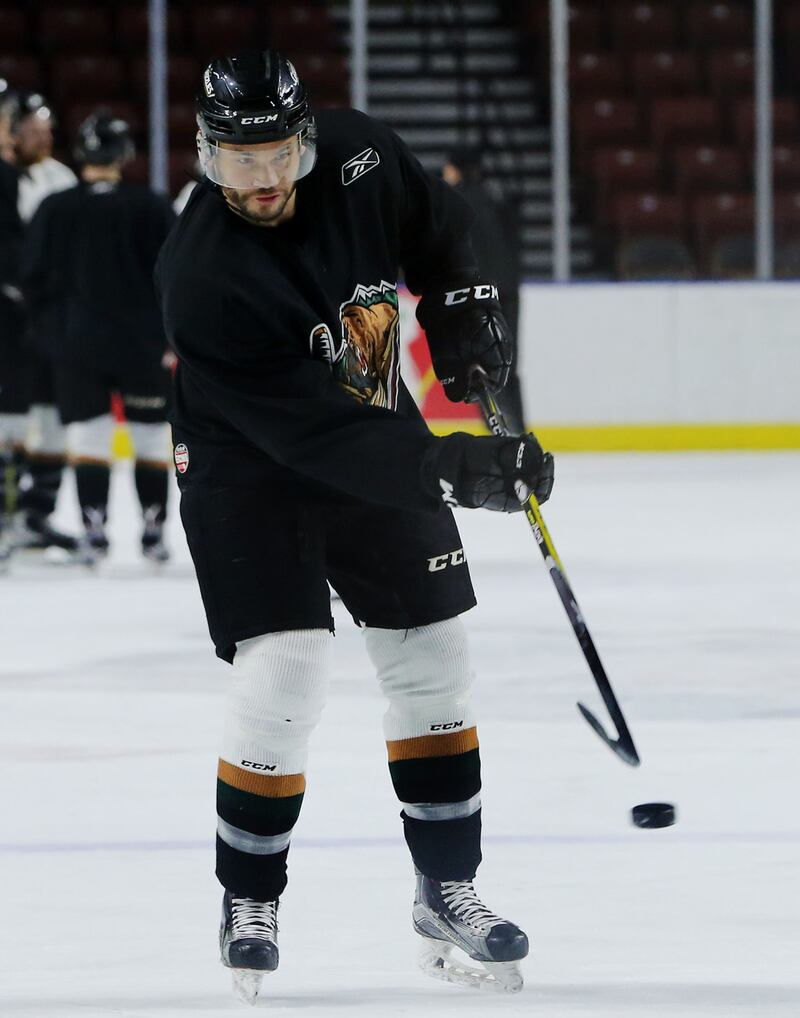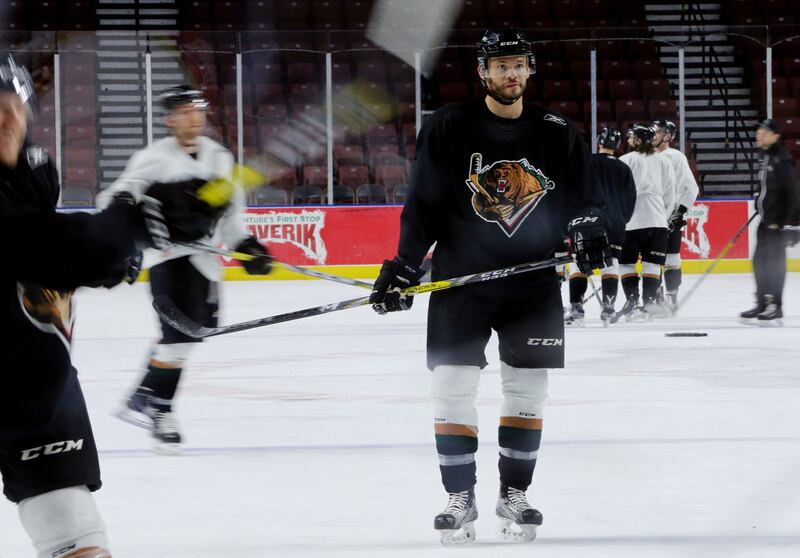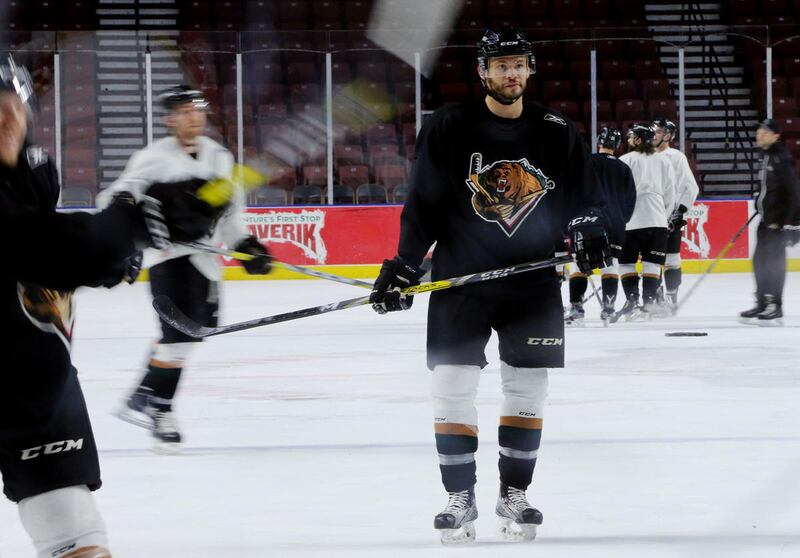That’s the funny thing about this game and especially at this level. You can never look too far ahead in the future. You never know what will pop up what will happen. This is a good place for me now. – Evan Stoflet
SALT LAKE CITY — They say you can’t go home again, at least that’s what Thomas Wolfe’s iconic novel from the 1940s claimed. That old adage doesn’t apply to Utah Grizzlies’ hockey player Evan Stoflet, who has come home not once, not twice, but three times since living in Utah as a young teenager.
The 32-year Stoflet is on his third tour of duty with the Grizzlies and enjoying playing in front of friends and family — again — after playing on opposite sides of the world for a few years as well as cities in every region of the United States, from Montana to Iowa to California to New York to Texas. Most recently, he played for two years in China, an experience he called “nuts,” but one that he says he’ll always cherish.
Stoflet is a defenseman for the Grizzlies, who stand 25-22-5 and are making a strong playoff push with 19 games left. As the oldest player on the team, Stoflet is counted on for his leadership and has no problem when teammates call him “old man” or “grandpa.”
“Oh yeah, it’s coming full circle,” he says of the razzing he gets from his younger teammates. “I did the same thing when I was first starting playing. It’s a cycle of life, I guess.”

Utah coach Tim Branham can’t praise Stoflet enough, saying, “He brings good leadership to this group and helps the younger guys. He helps them feel comfortable, whether it’s systems or how to be a professional, because he’s a true professional. He comes to the rink the same every single day with the same attitude, the same preparation.”
An engaging young man with an easy smile, Stoflet is genuinely grateful for the opportunity he has to still be playing professional hockey and especially to be playing in what he considers his hometown.
“It’s such a unique experience to be able to play in a place where I lived for so long,” he said. “It’s been segmented, but I’ve lived here for so long. Obviously being near my parents after being away for so long is nice. I have legitimate friends here in the community that I didn’t get to see for years. It’s nice … real nice.”
Born in Wisconsin, Stoflet moved with his family to Illinois as a youngster, but came out to Utah in 1996 because of his father’s employment. Evan was just going into seventh grade, and he lived in West Jordan for a couple of years. A good athlete who played football, baseball and soccer, he decided hockey was the sport he wanted to pursue, so at the age of 14, he moved back to live with his grandparents in Wisconsin, where hockey is a much bigger deal than Utah.
By his junior year of high school, Stoflet was off playing Junior Hockey, where he had a condensed school schedule for three hours a day, while practicing hockey several hours every day. He traveled around playing in competition, moving first to Bozeman Montana, followed by Des Moines, Iowa. Then it was off to college at the University of Vermont, where he played for four years.
When his collegiate career ended, he turned professional, and his first stop was Texas, where he played for the Corpus Christi Rayz, in the Central Hockey League. The following year he made his first professional stop in Utah as a member of the Grizzlies.

“It was one of those things where I wanted to play in this league, so a mutual friend put me in contact with the coach here and it went from there,” he said. “You don’t often see that, where there’s a team where you live. It worked out well.”
Jason Christie was the coach who signed him, but he left the team within a month and Kevin Collie took over as the coach for the 2008-09 season. Stoflet had a good year with a couple of goals and 11 assists from his defense position as well as a plus-21 for his time on the ice.
“It was weird because I hadn’t lived this close to my family in six years or so,” he said. “But it was nice because I had friends here and I was pretty comfortable instead of coming to a team new. My parents were really pumped because they got to see me more when I was 24 than when I was 16.”
However, 13 games into the next season, Stoflet was abruptly traded to the Bakersfield Condors in the ECHL. After two seasons with Bakersfield, Stoflet decided he wanted to try playing in Europe and found a professional team in Copenhagen.
“Copenhagen is one of those cities that everyone says you should visit and it is an awesome city,” he said. “It was a lot of fun and I saw a lot of cool stuff. I can’t say enough about how awesome Copenhagen was.”
The only problem was the team management wasn’t so awesome, and his paychecks were always late. Then one day, he and a couple of other Americans were told they couldn’t afford to be paid anymore, and after just three months there, Stoflet headed back to the States with a promise that he would get paid. The team folded a year later, but Stoflet never saw his final paycheck. He finished off the 2012 season in New York with the Elmira Jackals, another ECHL team, in the Eastern Conference.
Collie was still the coach of the Grizzlies and he contacted Stoflet’s agent after the season and asked if he would be interested in returning to Salt Lake City. Stoflet said “sure” and so he was back in Utah, for the 2012-13 season, where he scored three goals with 11 assists.

After that season, Stoflet decided he wanted to give Denmark another try, so he played for a team on the other side of the country, in a smaller town on the west coast called Esjberg had a much better experience.
“I had a good coach and I was able to play with some guys I went to college with,” he said. “It was a fun experience — and we got paid.”
By that time, he’d had enough of Europe and he found an unusual opportunity to play in China, where hockey is still in its infant stages.
“That was nuts,” he says of his experience in China. “I’d never had the culture shock as when I landed in Beijing. Countries have different way of doing things and China was so much different that anything that I’d experienced before.”
Stoflet’s team played in Qiqihar, way up north away from the large metropolitan areas of China like Beijing and Shanghai. His club was the only Chinese team in the Asian Ice Hockey League, which included four teams from Japan, three from South Korea and one from eastern Russia. He said there was a translator on the staff, but he “obviously couldn’t follow you around everywhere.”
Stoflet’s coach was Japanese, so he’d have to explain team drills in his language and the translator would have to give the instructions to both the Chinese and English-speaking players.
“By the time it got to us, it didn’t always translate quite right and was pretty comical,” he said, “So if we were getting chewed out, we were getting yelled out in Japanese, Chinese and finally English.”
Stoflet said he and his North American teammates would get a lot of strange looks from the Chinese natives, who’d never seen many non-Asian folks in that part of the country.
“It was pretty funny how somebody would stare at you from 20 feet ahead and you’d walk past them and turn around they’d still be staring at you,” he said. “Random people would want to take pictures with you.”
As for the competition, Stoflet called it “pretty good,” though “not as physical as over here.” He said China is trying to make a conscious effort to boost hockey because the country is getting the Winter Olympics (in 2022).
“So it was lot of adventure -- you kind of toss yourself out there and see what you come back with -- how long it takes you to get there and back and what kind of food you’re going to end up eating.”
But Stoflet appreciated the experiences even if it was much more challenging than Denmark where most everybody speaks English.
“It was really cool and I really liked that fish-out-of-water type feeling,” he said. “I really liked to rub elbows with the locals – it’s the best way to get a new perspective on things.”
After two years living in a different culture, eating strange food and not having many people to talk to, Stoflet headed back to America and was happy to land back in Utah.
It doesn’t concern Stoflet in the least that he is the old man on the Grizzlies and one of the oldest players in the league. He knows that hockey players play longer than athletes in most other sports, and he’s not planning to hang up the skates any time soon.

“It’s all over the map,” he says. “Two years ago I played with a goalie who was turning 38. It’s just however long your body can hold up and however much you enjoy it and still want to play.”
Branham doesn’t count out Stoflet sticking around for awhile.
“You never know. He keeps himself in good shape, that’s for sure, he’s in real good shape, especially for his age,” Branham said. “When you’re in good shape you can play a long time — look at Jaromir Jagr (still playing in NHL at age 45). Evan works hard to keep his body in good shape.”
Stoflet jokes “I have no idea what I want to do when I grow up,” but he hopes to stick around Utah for more than a year this time.
“That’s the funny thing about this game and especially at this level,” he said. “You can never look too far ahead in the future. You never know what will pop up what will happen. This is a good place for me now.”







